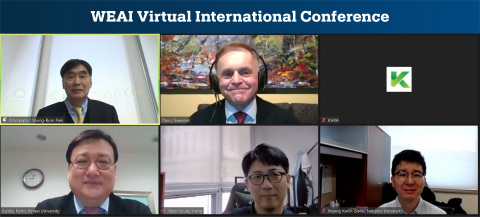SEOUL, South Korea--(BUSINESS WIRE)--New proposals with regards to Korea’s tobacco control policy have drawn international attention following its release at Western Economic Association International (WEAI) Virtual Conference, an internationally recognized economics conference, which is held for 3-days from March 17.
WEAI is an economics conference which was first founded in the United States in 1992, having over 2,000 economists as members as of now. The conference is being held on-line due to COVID-19. Numerous economists hailing from both Korea and abroad convened for a heated debate on the topic of a new direction for tobacco control policy in Korea.
Professor Sun-Ku Hahn from Yonsei University School of Economics, who led the first presentation on March 18, explained the results of his study drawn by using a consumer selection model that compared combustible cigarettes (conventional cigarettes) and non-combustible cigarettes (heated tobacco products, e-cigarettes) based on Hyperbolic Discounting Theory. The results were then cross tested with real-life data from the Korea National Health and Nutrition Examination Survey. The results showed that with one’s health in mind, an individual who smoked a relatively higher number of combustible cigarettes was more likely to attempt use of non-combustible cigarettes - proving that the likelihood to quit smoking was higher and the level of consumption of combustible cigarettes was lower in the case of non-combustible cigarette smokers. Through this, the currently hotly debated topic of non-combustible as a harm-reduction mechanism was proven, whilst the argument that non-combustible cigarettes are a gateway product to combustible cigarette use was refuted. Professor Hahn stated that “Tobacco control policy that is most beneficial to public health is adopting a harm-reduction policy like western countries and helping smokers switch to less harmful tobacco products,” and made clear that combustible cigarettes had a higher luring effect compared to non-combustible cigarettes to first-time smokers.
Alternative approaches to the tobacco tax system were also proposed. Professor Kwon Ill-Oong of Seoul National University Graduate School of Public Administration presented the necessity of implementing inflation-indexed tobacco tax. Professor Kwon emphasized that tobacco taxes should be inflation-indexed like taxes on alcohol, with a different level of tax applied to products based on its level of harm and price elasticities. He added that the inflation-indexed tobacco tax not only raises consumer predictability, but also eases societal push-backs from a sudden increase of the tax on tobacco - a reason why it is numerously implemented in various countries.
Professor Woo-Hyung Hong from Hansung University Department of Economics proposed another change to the current tobacco tax systems which highlighted the necessity of taxing tobacco products based on the level of external costs it generates. Professor Hong stated that tobacco taxes should be differentially imposed based on economic external costs ensued by each type of tobacco product. Professor Hong also stated that medical costs, loss of labor capital costs, costs from cigarette-related fires, the novel concept of ‘avoidance costs,’ all as a byproduct of smoking should be factored into a differential tax system relative to external costs of each tobacco product type.
Through a systematic review of literature by the hundreds, Professor Park Young-bum of Hansung University Department of Economics explored the current state and limitations of the current tobacco control policy in Korea and proposed the need for the implementing a harm-reduction policy on a tobacco product, as a supplementary measure to the current tobacco control policy, to initiate smokers to switch to less harmful tobacco products. Professor Park stated that the government is most definitely aware that the current tobacco control policy is leaning towards more strongly regulating e-cigarettes and other novel tobacco products and adversely increasing the sale of more harmful conventional cigarettes. Professor Park also noted that flavor capsuled cigarettes and other conventional cigarette products should be regulated first, due to their smoking initiation effects among women and youth.
As an expert on public health policy, Professor David Sweanor from the University of Ottawa stated that “it is now time for Korea to implement a harm-reduction policy like western countries, and allow smokers to switch to less harmful tobacco products.” Professor Sweanor also added that “Korea should follow in the footsteps of New Zealand which passed a bill acknowledging e-cigarettes as a less harmful alternative - and also duly review harm levels through precisely set guidelines and release the information to the public under the policy keynote of harm-reduction policy.”




